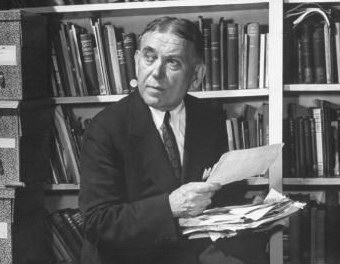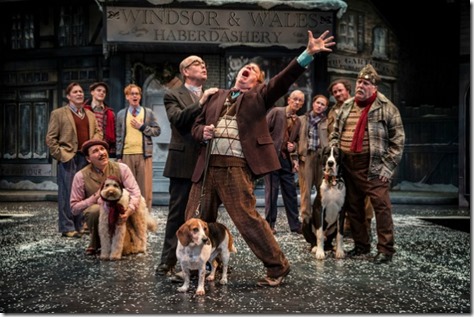I’ve just updated the Top Five, “Out of the Past,” “TT in Commentary” and “TT Elsewhere” modules of the right-hand column with a fresh selection of picks and links. Scroll down and take a peek.
Archives for January 7, 2014
CD
Big Bill Broonzy, These Blues Are Doggin’ Me (Living Era). An astutely chosen anthology of twenty-six recordings made between 1930 and 1951 by the influential Chicago blues singer-songwriter (he wrote “Key to the Highway”) who was embraced in later life by the nascent folk-music movement. If you don’t know Broonzy’s music, this is a good way to get started. Concise but informative liner notes by Digby Fairweather (TT).
PLAY
Port Authority (Writers Theatre, Books on Vernon, 664 Vernon Ave., Glencoe, Ill., extended through Mar. 2). A breathtakingly intense and intimate Chicagoland revival of Conor McPherson’s 2001 trio of interlocking monologues by a group of desperately disappointed, deceptively ordinary-looking Irishmen, infallibly staged by William Brown (TT).
CD
Toscanini at the Queen’s Hall: The June 1935 BBC Symphony Concerts (West Hill Radio Archives, four CDs). A newly remastered and immensely significant collection of live performances recorded when the greatest conductor of the twentieth century was at the peak of his incomparable powers. The BBC Symphony was also an extraordinarily fine ensemble in 1935, and Toscanini’s leadership galvanized its superlative players and goaded them to new heights of excellence. The fare includes Beethoven’s Seventh Symphony, Brahms’ Fourth Symphony, Debussy’s La Mer, Elgar’s “Enigma” Variations, and Mozart’s “Haffner” Symphony. Excellent notes by Christopher Dyment (TT).
GALLERY
Yvonne Jacquette: The High Life (DC Moore, 535 W. 22, up through Feb. 8). Cityscapes and landscapes seen from a bird’s-eye point of view, rendered by a painter whose precisionist inclinations occasionally recall Charles Sheeler but whose feel for color and sense of fantasy are all her own (TT).
FILM
Outsourced. I only just caught up with this sweet, smart clash-of-cultures romcom about an uptight novelty salesman (Josh Hamilton) who is sent from Seattle to India to ride herd on the employees of an underperforming call center. Naturally he falls in love with one of them (Ayesha Dharker), but nothing else about this indie flick, which makes its points with a lovely lightness of touch, is predictable. Directed and co-written by John Jeffcoat, Outsourced failed to make a splash on its original release in 2006, but it deserves to be as well known as Bill Forsyth’s Local Hero, with which it has much in common. If you liked one, you’ll like the other (TT).
TT: First time, every time
A childhood friend writes:
How do you keep things fresh at 57? How do you look past the “formula” of a good story and just view the telling? Do you ever pass on a review because you couldn’t get the right perspective?
 Rightly or wrongly, I don’t find this to be a problem, except on the rare occasions when I feel I’ve already said everything that I’ve got to say about a given topic. (I no longer feel that I have anything particularly new to say about Aaron Copland or H.L. Mencken, for instance, so I don’t seek out opportunities to write about them.)
Rightly or wrongly, I don’t find this to be a problem, except on the rare occasions when I feel I’ve already said everything that I’ve got to say about a given topic. (I no longer feel that I have anything particularly new to say about Aaron Copland or H.L. Mencken, for instance, so I don’t seek out opportunities to write about them.)
My friend, however, puts his finger on a very interesting point in his second sentence. My Wall Street Journal columns are usually about eight hundred and fifty words long. That’s more than enough room to make my points, but not to “circle the airport,” so to speak. As a result, I can’t waste space on formulaic throat-clearing: I have to cut right to the chase. And when I’m reviewing a well-known play about which I’ve previously written, it’s even more important than usual that I approach the text as if it were new to me.
More often than not, the production itself solves that problem for me. My recent column about Barbara Gaines’ new Chicago Shakespeare production of The Merry Wives of Windsor, however, posed a special challenge, for Gaines has staged that play twice in the past decade, the first time in 2004. I saw and reviewed her earlier staging, and I’ve also covered two other productions for the Journal, at Shakespeare & Company in 2006 and at San Diego’s Old Globe in 2008. Would I have anything fresh to say this time around?
 I looked up my previous columns and discovered that in all three cases I’d written fairly brief notices that concentrated on the staging and performances, taking the merits of the play for granted. So I doubled down, devoting the entire column to The Merry Wives of Windsor (something that I don’t normally have the luxury of doing) and counting on Gaines, whose work I admire greatly, to make it worth my while.
I looked up my previous columns and discovered that in all three cases I’d written fairly brief notices that concentrated on the staging and performances, taking the merits of the play for granted. So I doubled down, devoting the entire column to The Merry Wives of Windsor (something that I don’t normally have the luxury of doing) and counting on Gaines, whose work I admire greatly, to make it worth my while.
As it turned out, I found her staging to be both satisfying and inspiring, so much so that I spent the whole first paragraph in what I think of as my “teaching mode,” talking about the play rather than the production and moving, as I like to do in theater reviews, from the general to the particular:
Humiliation is the engine of farce. He who laughs first is setting himself up for a pie in the face, and what makes it so funny is that he usually deserves it. But Shakespeare’s comedies of humiliation are also comedies of reconciliation in which the prideful are punished, then readmitted to the fold after they do penance by being made the butt of justified laughter. That’s why Malvolio’s bitter exit line in “Twelfth Night,” “I’ll be revenged on the whole pack of you,” is so unnerving: He refuses to play the game. And that’s why “The Merry Wives of Windsor,” in which Sir John Falstaff is punished for his unseemly lust, is so full of good humor: He isn’t the only one who takes the pie in the face. The humiliation is shared all around, after which everyone forgives everyone else and goes home together to “laugh this sport o’er by a country fire;/Sir John and all.” If you don’t go home happy from a production of “Merry Wives,” there’s something wrong with you–or the production.
The point is that I get excited every time I walk into a theater, and every time I sit down the next morning (or whenever) to think out loud about what I saw there. Nor do I think my drama reviews are formulaic, even when I’m forced, as sometimes happens, to review a formulaic show. Even after spending a decade on the aisle, I continue to find my job to be infinitely self-renewing. Perhaps I’ll feel differently a decade from now, assuming that I’m still writing theater reviews in 2024–but I doubt it.
TT: Lookback
From 2004:
I’m in the process of writing a brief life of Balanchine for Harcourt, so I expect to be going to NYCB two or three times a week throughout the next couple of months. I just returned from my first performance of the winter season, an all-Balanchine triple bill of Prodigal Son, Serenade, and Scotch Symphony, two masterpieces and a lesser but nonetheless delightful effort. I brought with me a jazz musician who’d never seen any of Balanchine’s choreography, and was eager to find out what she’d been missing.
Most serious balletgoers (if not all) have felt for some time now that NYCB was in decline, and tonight’s performance did little to prove them wrong….
On the other hand, it’s also worth reporting that my guest was stunned–the only possible word–by her first encounter with Balanchine’s choreography. I gave her a discreet glance at the end of Serenade and saw that she was crying softly. That’s just as it should be: Balanchine’s greatest ballets are sturdy enough to make their effect even in unfocused, infirm performances. I wouldn’t have dreamed of telling her that last night’s Serenade, for all its virtues, was far removed from the way that immortal masterpiece looks when lovingly set by a first-string repetiteur on a meticulously rehearsed company. For her, the only thing that matters is that she’s just discovered a new world of beauty whose existence she never even suspected. I envy her….
Read the whole thing here.
